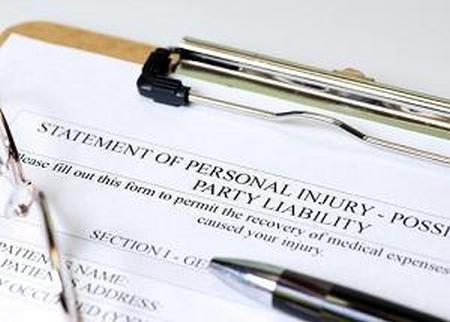Recent Blog Posts
Should You File a Personal Injury Claim for Your Injury?
 At the receiving end of an accident, there is always a victim—a person whose life has been altered; a family that is struggling to pay their bills because of unpaid medical bills and lost time at work; someone who is stressed and injured and unsure of how to put the pieces back together. But there is help available. A personal injury claim could help you and your family move forward. The following information can help you determine if you may be eligible.
At the receiving end of an accident, there is always a victim—a person whose life has been altered; a family that is struggling to pay their bills because of unpaid medical bills and lost time at work; someone who is stressed and injured and unsure of how to put the pieces back together. But there is help available. A personal injury claim could help you and your family move forward. The following information can help you determine if you may be eligible.
Auto Accident Claims
Drivers carry insurance to protect themselves, should an accident happen. If one happens to you or someone you love, you should immediately file a claim with the at-fault driver’s insurance. However, it is important to understand that, in Illinois, compensation payouts are based upon fault. Insurance companies will use this to their full advantage by shifting as much blame as they can over to you, ultimately reducing their payout. If they cannot shift blame, then they will attempt to reduce their payout by minimizing your losses and injuries.
DUI Accidents Claim Three Lives Every Two Hours in America
 If you feel like DUI accidents make headline news entirely too often, then you are not alone. Every two hours, three lives are lost because of drunk driving in America. Yet the problem persists. Lax laws regarding license suspension and revocation are at least partially to blame, but understanding the DUI problem in America is not quite that simple. There are other factors at play - some of which may not be known or understood at this point in time. But one thing is clear: something must be done to ensure victims receive the justice they deserve.
If you feel like DUI accidents make headline news entirely too often, then you are not alone. Every two hours, three lives are lost because of drunk driving in America. Yet the problem persists. Lax laws regarding license suspension and revocation are at least partially to blame, but understanding the DUI problem in America is not quite that simple. There are other factors at play - some of which may not be known or understood at this point in time. But one thing is clear: something must be done to ensure victims receive the justice they deserve.
Protecting Yourself from a DUI Accident
While it is sad that victims must be the ones to take preventative measures to avoid a drunk driving accident, the pervasiveness of DUI accidents make avoidance precautions necessary. Reduce your risk of becoming a DUI crash victim by:
- Avoid driving late at night (if you must drive, avoid two-lane highways and country roads);
Deferred Action for Childhood Arrivals: After US v. Texas
 In June 2016, the Supreme Court, still with only eight justices after the passing of Justice Antonin Scalia, issued a per curiam opinion affirming the ruling in U.S. v. Texas, which contested President Obama’s ambitious immigration plans. A per curiam opinion is an opinion issued in the name of the court, rather than any individual justice, and it effectively halts any expansion of Deferred Action for Child Arrivals (DACA) for the foreseeable future. Naturally, many are wondering what their options are after this ruling.
In June 2016, the Supreme Court, still with only eight justices after the passing of Justice Antonin Scalia, issued a per curiam opinion affirming the ruling in U.S. v. Texas, which contested President Obama’s ambitious immigration plans. A per curiam opinion is an opinion issued in the name of the court, rather than any individual justice, and it effectively halts any expansion of Deferred Action for Child Arrivals (DACA) for the foreseeable future. Naturally, many are wondering what their options are after this ruling.
The Basis for Challenge
President Obama’s proposed program, referred to as Deferred Action for Parents of Americans and Lawful Permanent Residents (DAPA) or DACA+, would have conferred deferred action status on approximately five million undocumented immigrants if they met certain requirements, such as maintaining good moral character and having significant ties to the United States. Deferred action is defined as a choice to hold off on removing an individual, and it is essentially an accepted form of prosecutorial discretion.
Should You Financially Plan for Divorce While Still Happily Married?
 According to the most recent statistics, around one-third of all marriages end in divorce. That means, for every 12 couples that marry, about four will eventually call it quits. Often, this process is one full of contention, but it also comes with the risk of future financial problems. Those at the highest risk are those marriages in which at least one party is not fully aware of (or does not participate in) the financial aspects of the marriage. That leads to the question of whether or not all couples should plan for divorce, long before they ever consider filing.
According to the most recent statistics, around one-third of all marriages end in divorce. That means, for every 12 couples that marry, about four will eventually call it quits. Often, this process is one full of contention, but it also comes with the risk of future financial problems. Those at the highest risk are those marriages in which at least one party is not fully aware of (or does not participate in) the financial aspects of the marriage. That leads to the question of whether or not all couples should plan for divorce, long before they ever consider filing.
Arguments Over Money and Your Risk of Divorce
While the amount of money a couple has is often irrelevant to whether or not a marriage will eventually end, those show argue over it – how to spend it, invest it, or save it – have a much higher risk of divorce than those who do not. As a result, experts have encouraged couples to talk about money early on in their relationship, long before the marriage ever starts. No matter how you decide to handle it, one thing is clear: staying open and honest about money during your marriage may very well be your saving grace. Even if your marriage does end in divorce, the process itself is often easier because both parties know what is owned and what is not, and there are fewer issues to argue over in the divorce process.
Divorce or Legal Separation – Which One is Right for You?
 Although people often use them interchangeably, divorce and legal separation are actually two different legal procedures. Each has its own set of advantages and disadvantages, and one does not need or rely upon the other. In fact, many couples legally separate and never divorce, and others divorce without ever going through a legal separation. Still not sure which is right for you? Start with the following information, which explains the differences, benefits, and drawbacks of both divorce and legal separation.
Although people often use them interchangeably, divorce and legal separation are actually two different legal procedures. Each has its own set of advantages and disadvantages, and one does not need or rely upon the other. In fact, many couples legally separate and never divorce, and others divorce without ever going through a legal separation. Still not sure which is right for you? Start with the following information, which explains the differences, benefits, and drawbacks of both divorce and legal separation.
Divorce in Illinois
Divorce – or the dissolution of a marriage – is a legal process used to end (dissolve) a marriage. Parties equitably split their assets, determine allocation of parental responsibilities, parenting time, alimony, and/or child support, and they may remarry any time after the process is over. You do not have to live apart prior to filing, nor do you have to file for a legal separation before filing for divorce. However, you must fully understand that, once complete, the marriage is over. For some, this is too big of a step, and they may choose legal separation instead.
Voluntary Departure & When To Take It
 Sometimes, there are occasions when it is simply not possible to remain in the United States. The evidence of a legal violation is simply too high to explain away or rationalize. In those cases, it is always better to cut one’s losses, and this can often be done by taking advantage of voluntary departure if it is offered to you. Sometimes, however, voluntary departure is not the best option, so it is an advantage to understand its mechanics on an in-depth level to make an informed choice.
Sometimes, there are occasions when it is simply not possible to remain in the United States. The evidence of a legal violation is simply too high to explain away or rationalize. In those cases, it is always better to cut one’s losses, and this can often be done by taking advantage of voluntary departure if it is offered to you. Sometimes, however, voluntary departure is not the best option, so it is an advantage to understand its mechanics on an in-depth level to make an informed choice.
The Basics
Voluntary departure can be requested while you are in immigration proceedings, either directly before your Master Calendar hearing (the brief introductory hearing, where you first speak with an immigration judge) or at the end of proceedings. It is important to understand what voluntary departure actually entails, however; there are potentially severe penalties if you are granted voluntary departure and fail to actually leave.
Jack-Knifing Trucks a Danger to Cars
 Sharing the roadways with heavy tractor-trailers can be scary for many drivers. Their sheer size, enormous tires, and heavy loads monopolize the road and make lanes tighter for cars other passenger vehicles. They travel at the same speeds—and often faster—but their size makes them more likely to create a major hazard on the roads. With 924 truck fatalities in Illinois in 2014, mostly in urban areas, it is clear how much of a danger large trucks can be.
Sharing the roadways with heavy tractor-trailers can be scary for many drivers. Their sheer size, enormous tires, and heavy loads monopolize the road and make lanes tighter for cars other passenger vehicles. They travel at the same speeds—and often faster—but their size makes them more likely to create a major hazard on the roads. With 924 truck fatalities in Illinois in 2014, mostly in urban areas, it is clear how much of a danger large trucks can be.
A common occurrence in a truck accident is when a truck “jack-knifes,” which occurs when the driver brakes suddenly and the trailer swings to a ninety-degree angle from the cab, creating an L-shape. The “swing” of the trailer as it moves, will swipe anything in its path, creating deadly consequences for anybody in those vehicles. If this has happened to you or your loved one, seek honest, experienced advice from a personal injury attorney to determine if you have a viable legal case to pursue.
Divorce Continues to Negatively Affect Children
 Early studies on children of divorce found that divorce negatively impacted children in all sorts of ways. They struggled in school, found it difficult to adjust, suffered psychological problems long into adulthood, and often experienced issues in their own adult relationships. Divorce has changed a lot since then – it is more common, more socially acceptable, and it is far more likely that both parents will continue to be a part of the child’s life after the divorce. However, more recent studies have found that the effect of divorce on children has changed very little.
Early studies on children of divorce found that divorce negatively impacted children in all sorts of ways. They struggled in school, found it difficult to adjust, suffered psychological problems long into adulthood, and often experienced issues in their own adult relationships. Divorce has changed a lot since then – it is more common, more socially acceptable, and it is far more likely that both parents will continue to be a part of the child’s life after the divorce. However, more recent studies have found that the effect of divorce on children has changed very little.
Possible Negative Effects of Divorce on Children
There is no shortage of studies on children of divorce. One published in Journal of Youth and Adolescence found that twice as many children from divorced families experienced a condition known as “destructive parentification” – a situation in which the child takes on parental responsibilities, possibly even caring for the parent themselves. The effect was found to be long-lasting, carrying into many of their adult lives. Many went on to experience anxiety or depression of their own and struggled with forming healthy romantic relationships.
Children Injured in Car Accidents Fare Better When Treated at Pediatric Trauma Centers
 While improvements in safety regulations on automobiles and car seats have become more stringent to protect children from injury and fatality during an auto accident, traffic fatality remains the leading cause of death among those under the age of 4. Even more concerning is that the number of child fatalities has slightly increased, going from 1,139 in 2011 to 1,168 in 2012. However, a recent study suggests that some of those deaths could be prevented if children were treated at designated pediatric trauma centers instead of general adult trauma centers.
While improvements in safety regulations on automobiles and car seats have become more stringent to protect children from injury and fatality during an auto accident, traffic fatality remains the leading cause of death among those under the age of 4. Even more concerning is that the number of child fatalities has slightly increased, going from 1,139 in 2011 to 1,168 in 2012. However, a recent study suggests that some of those deaths could be prevented if children were treated at designated pediatric trauma centers instead of general adult trauma centers.
Non-Pediatric Trauma Centers versus Pediatric Trauma Centers
Published in the Journal of Pediatric Surgery, the recent study examined medical data of 28,145 patients under the age of 18 injured in an automobile accident to determine the quality of care of those treated at general adult trauma centers against those treated at pediatric trauma centers. Overall, 21.4 percent received treatment at a combination pediatric and general adult trauma center, 58 percent received treatment at a general adult trauma center, and 19.9 percent received treatment at a pediatric trauma center. Their injuries included those to the head and neck (66.2 percent) and multiple injuries (42.7 percent).
Asset Division in Divorce More Complex Than Most Couples Realize
 Most couples realize that the divorce process is an emotionally and mentally taxing process. However, many underestimate just how financially complicated divorce can be. Then there are those who are at risk of losing money in their settlement because their spouse is deceptively hiding or dissolving marital assets. If you are planning on filing for divorce, prepare yourself for the complexities of dividing assets during divorce with the following tips.
Most couples realize that the divorce process is an emotionally and mentally taxing process. However, many underestimate just how financially complicated divorce can be. Then there are those who are at risk of losing money in their settlement because their spouse is deceptively hiding or dissolving marital assets. If you are planning on filing for divorce, prepare yourself for the complexities of dividing assets during divorce with the following tips.
Know What You Own
Before you can fairly divide your assets, you must first know what you own. This might seem obvious, but for those that have been in the dark about their day-to-day finances, uncovering their shared marital assets can seem like an overwhelming task. Do not despair! There are ways that you can track down finances and discover assets.
For the most obvious, easy to find information, such as a car or a home, contact the lender and find out how much is owed. If you and your spouse have a joint bank account,contact your financial institution to verify account information, such deposit amounts and withdrawals. To find information on retirement accounts, look at pay stubs or annual summary notifications. If you run into trouble accessing information, your attorney can help you track down information and pull assets into discovery.
 English,
English,
 Spanish,
Spanish,
 Polish,
Polish,
 Urdu
Urdu












 Make a Payment
Make a Payment



